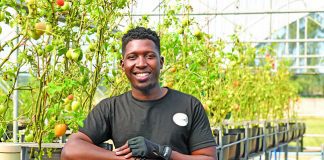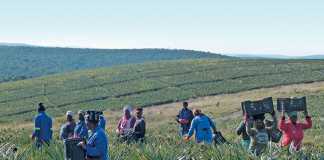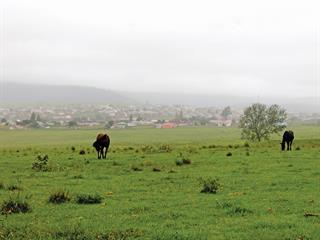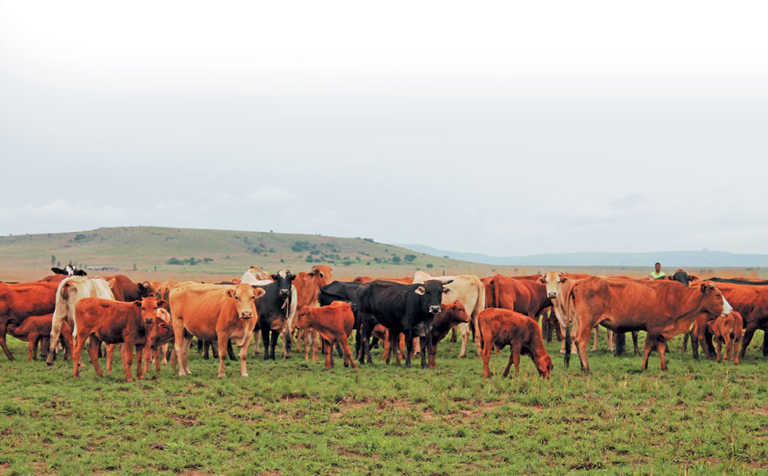
Photo: Lloyd Phillips
Gugulethu (Gugu) Zondi was born and raised in the rural areas of Emathulini and Ozwathini in upper Tongaat in KwaZulu-Natal. She spent her childhood herding her father’s cattle.
This delayed the beginning of her school career, and she only started Grade 1 when she was nine years old. Nevertheless, she successfully completed matric in 1986.
Interest in farming
Since completing school, Gugu has been involved in a couple of professions. A teacher by training, she also worked as a bank teller. In 1998, while pregnant with her twin girls, she quit formal employment and started working with communities in rural areas throughout KZN.
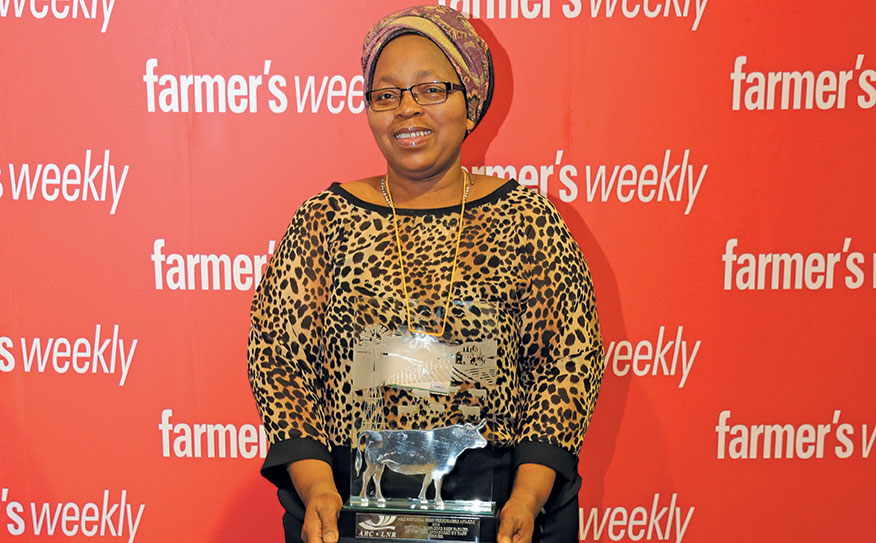
It was during this time that she also began farming, and produced amadumbe and potatoes on 3ha of communal land.
She sold her produce to the local community, especially at pension-collection points. She also supplied informal traders and the morning fresh produce markets in Tongaat and Verulam.
“I was using a 20ℓ empty tin, which we call igogogo, to weigh produce. I didn’t calculate the produce in tons,” she says.
“The important thing when you’re a small producer is to have good-quality produce to offer your customers, and to make a profit that will enable you to cover production costs so that your business is sustainable.”
Gugu later diversified into poultry and Nguni cattle, but soon realised that the potential for growth of her livestock concern was limited on communal land because of a lack of sufficient grazing.
Water was also a limiting factor, because streams dried up in winter.
These challenges motivated her to procure her own land.
Accessing land
In 2009, she applied for land through the Department of Rural Development and Land Reform’s (DRDLR) Proactive Land Acquisition Strategy (PLAS). Her request was approved in 2013, and she was granted the 600ha farm, Brakspruit.
PLAS focuses primarily on empowering the poor, and involves the state buying land with high agricultural potential.
The DRDLR then selects beneficiaries to lease the land, with the option to purchase it in future.
It did not take Gugu long to adapt to moving from communal land to farming her own land:
“I was already actively involved in farming, and the DRDLR land allocation team was helpful and so cooperative. It definitely counted in my favour that I also already had farming experience,” she says.
Some of the requirements she had to meet to be considered for the PLAS programme included farming experience, access to capital to invest in farming, and access to markets or take-off agreements.
The farm is situated at Bloedrivier in the eMadlangeni Municipality in KZN. About 520ha are used for grazing, while 60ha have been planted to yellow maize and 20ha to cowpeas.
The right breed
When Gugu took control of Brakspruit, she sold her Nguni cattle as they did not adapt to the new farming conditions. She continued farming poultry, however, as well as sheep and goats.
She also bought in Bonsmara and Brahman cows. She now runs a herd of 108 mixed-breed cows, nine bulls and 79 weaners.
READ Buy cattle from a reputable breeder
Gugu implements rotational grazing: cattle are rotated between seven camps, and graze a camp for two weeks. Grazing in summer is also supplemented, with each animal receiving a daily ration of 10kg of baled red grass (Themeda triandra) and turf grass.
They also receive winter and summer licks.
Gugu says one of the most valuable lessons she learnt while farming is the ability to adapt.
She has learnt, for example, that when buying livestock, it is always better to buy animals from farmers in areas with similar grazing and farming conditions to yours.
Gugu says she learnt this lesson the hard way when she lost some cattle and goats that could not adapt to conditions on her farm. In this instance, she had assumed that the weather conditions on her farm and the seller’s farm were similar.
“I realised that the decision about which breed I farmed should be based on suitability of breed to the environment, rather than choosing a breed that I have a particular affinity for.
“One of the most important lessons I’ve learnt is to treat farming as a business, and not to allow sentiment to influence my decisions,” she says.
“I decided to invest in breeds that were well adapted to the local farming conditions, and that’s why I chose Bonsmara and Brahman cattle. These breeds are also able to maintain good condition during weaning.”
Data recording
Gugu receives support from the Agricultural Research Council’s (ARC) Kaonafatso Ya Dikgomo beef cattle recording and improvement scheme, a tool for accelerating the participation of smallholder farmers in the mainstream beef economy.
Since joining the programme in 2014, she has been keeping detailed performance records of all her cattle and sheep.
READ Performance testing: not only for stud farmers
“I manage my farm properly by keeping records on number of stock on the farm, date of birth, number of calves or lambs born per day, and sex of the calves or lambs. Head-counting of the cattle is done daily to check the health of the animals and to control stock theft.”
Gugu has also received support from the ARC’s mobile laboratory for artificial insemination (AI) and embryo transfer, which helps smallholder and emerging farmers in rural areas improve animal fertility.
The lab provides livestock reproduction services, including the analysis of the fertility of bulls in the veld. Farmers receive the results immediately after the analysis.
After only a year, with the help of the services provided by the ARC’s mobile lab, Gugu’s herd increased from 40 to 74 head of cattle. She says her record-keeping has also since improved.
Thokozani Ndonga, a senior research technician at the ARC, has been assisting Gugu.
He explains that the advantage of using the mobile lab is that the AI apparatus and equipment are secure and not exposed to sunlight. The insemination team is able to analyse the semen straws before insemination takes place, which results in higher conception rates.
With assistance from the ARC, Gugu was able to perform AI on her entire breeding herd during the 2015/2016 season. She achieved a 90% calving rate, and recorded no mortalities.
“The herd performance improved markedly. The age at first calving for the herd went from 26 months to 24 months, the average inter-calving period improved from 365 days to 330 days, and the average weaning weight for the herd improved from 220kg to 250kg at seven months,” she says.
”I keep roughly one bull per every 25 breeding females.”
The breeding season runs from November to February.
Female animals that fail to conceive during this period are sold. Ten cows are selected for AI and kept separate from the rest.
Gugu sells weaners at auctions, and also sells directly to clients. “I have some customers from Umzinyathi and Amajuba. My target customers are those who want to purchase cattle for lobola purposes.”
Challenges
Another valuable lesson she has learnt is that it is cheaper to vaccinate livestock than to treat them once they become ill.
Gugu vaccinates her cattle against black quarter, heartwater, botulism, anthrax, Pasteurella, three-day stiff-sickness and lumpy skin disease.
Cattle are also dipped to reduce tick infestation, which could cause diseases such as heartwater.
There is often a water shortage in winter, as well as a lack of grazing. To mitigate these effects, Gugu supplies her cattle with a feed supplement and hay throughout the season.
She also uses firebreaks to prevent veld fires, which mostly occur after winter.
Training initiatives
The farm is accredited by Agri SETA for practical and theoretical training, and helps with placing undergraduates from the Mangosuthu University of Technology, Mthashana College and the Cedara College of Agriculture for in-service training.
READ Training the future guardians of our natural environment
It is also used as a centre of excellence, where beef improvement workshops, facilitated by Cooperative Resource International, are hosted.
The farm also helps coordinate KZN Enterprise and Cooperative Development projects, aimed at developing emerging farmers to participate in the production value chain. Gugu is determined to see communal beef cattle farmers grow along with other emerging farmers, and is passionate about inspiring women to enter this traditionally male-dominated sector.
Phone Gugu Zondi on 082 482 9506, or email her on [email protected].
Phone Thokozani Ndonga on 012 672 9029 or 072 650 2811, or email [email protected].









